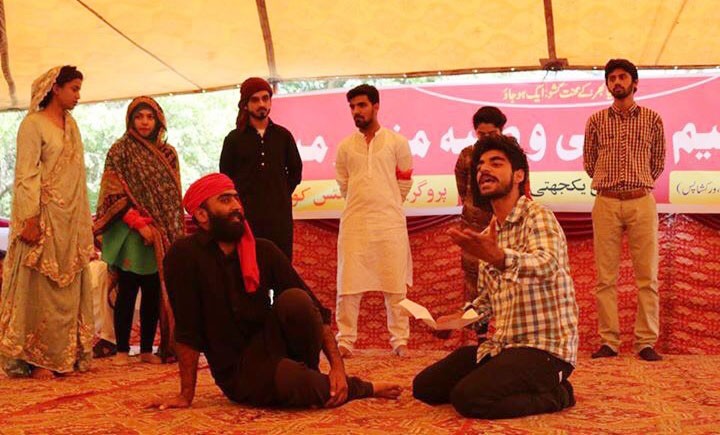
Mirza Ibrahim Mazdoor-Tulba Ittehad Mela brings workers and students together

The sun shines brilliantly in Lahore and the temperature hovers close to 39 degrees Celsius but every now and then, a mild breeze sweeps in to provide relief. Under the shamiana set up inside Pakistan Railway headquarters, amidst a celebration of iconic union leader Mirza Ibrahim’s legacy, lost historical links between the struggle of workers and students in Pakistan are being revisited.
Mirza Ibrahim Mazdoor-Tulba Mela is a collaborative effort of Progressive Students Collective, Railway Workers Union and People’s Solidarity Forum. The event, close to May 1, comprises nostalgic poetry and accounts of association with Ibrahim’s work by left-wing activists, and plays by students.
After an enthusiastic rendering of Najm Hosain Syed’s play "Deewa Mundri", performer Arooj Aurangzeb picks out a few powerful dialogues from the play signifying the oppression of workers by capitalist taskmasters and the fallacy of a promising future emerging from a system locked in a terminal doom loop. Where and how does the process start?
"Jithay vi kithay lod pendi jinaa’n nu kam tay laan di," unsuspecting victims are recruited to further capitalist interests, posits Syed.
Aurangzeb believes this dialogue essentially communicates how capitalist systems thrive by promising improved social status and power.
"We dream within the confines of a system and that is problematic in itself. When you think within the same confines, the same oppressive structures are perpetuated," says Aurangzeb.
She is a member of Sangat Group, a people’s theatre and her troupe travels to Sahiwal and Okara among other places to perform for local communities.
Huma Safdar, the leader of group, is actively involved in the alternative theatre movement in Lahore. She adds that revolution "isn’t a tangible thing. You cannot reach out and grab it; load it on a trolley and take it home with you. It is a process."
Another group of students chooses Habib Jalib’s ‘Raqs Zanjeer Pehan Ker Bhi Kia Jata Hay’ -- often used to stress the importance of resisting tyranny even when one is in shackles -- as inspiration for a play called ‘Bairyaan’.
Through poetry and theatrics, evoking memories of past successes of movements aimed at fighting oppression, attendees were encouraged to imagine an alternate reality that may not entirely be out of reach.
For Zafar Malik, Deputy General Secretary Railway Workers Union, Mirza Ibrahim’s work reinforces this idea and is inspiring.
"Even before the partition, he played an instrumental role in the struggle of the railway workforce against the government. He spent many years behind bars too but that didn’t weaken his resolve," he tells TNS.
"Investment in building the Mazdoor-Tulba Ittehad will reap great dividends", he says. He cites the effectiveness of the alliance in the past: it helped bring down Ayub Khan’s regime, and historically was instrumental in fighting the onslaught on democracy in Pakistan.
Left activist, Farooq Tariq too agreed that Mirza Ibrahim’s legacy would best be honoured by collaboration between students and working classes on issues relating to social welfare which are often overlooked.
Ammar Jan, a lecturer at Government College University Lahore, views this initiative as an effort to "connect groups [students, and workers] to their own past and lost power." The event, he says, is part of a larger goal to help bring both segments of society together by drawing attention to shared challenges especially relating to basic amenities and social infrastructure so that "alliances can coalesce naturally".